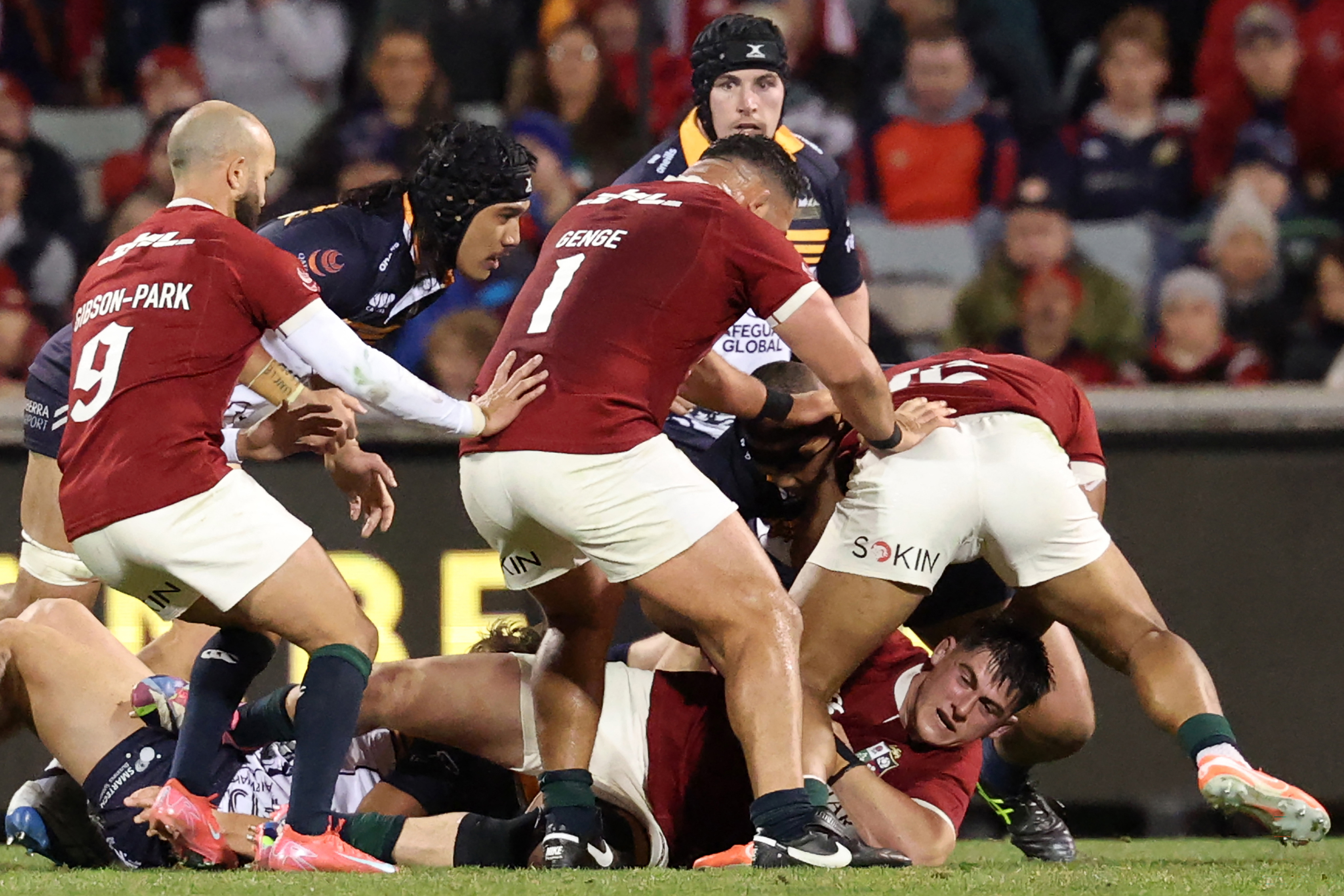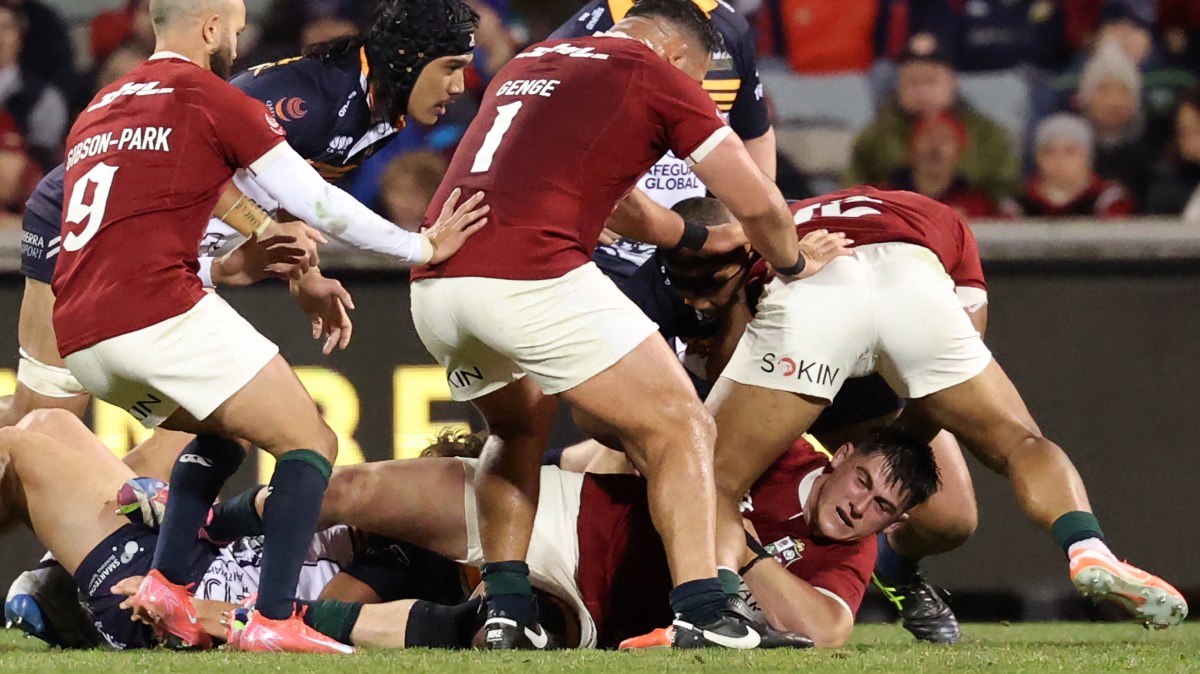The British & Irish Lions need to fix the breakdown. It is a glaring problem across the park and the Australians will undoubtedly be smelling blood before next Saturday’s first Test.
The Lions struggled in this area against the Waratahs last weekend, when the home side won six jackals to the Lions’ zero, and it continued in that sort of vein against the Brumbies on Wednesday, where the Lions were even turned over off first-phase ball. That should never happen. They are getting turned over from both structured and unstructured plays, and it needs to be sorted out.
Everyone seems to know that. Before the Brumbies game the head coach, Andy Farrell, and the prop Ellis Genge were talking about it, and then after the match the hooker Dan Sheehan, the scrum half Jamison Gibson-Park and the fly half Finn Russell were all referencing it too.
On the Sky Sports coverage I highlighted three examples of the problems in the Waratahs match, but I could have shown so many more occasions where the ball-carrier did not have the two support players in the close proximity he needed.
When the ball-carrier hits contact we were pausing the action, and really your support players should be within two metres at worst, but they were more like five to ten metres away, so it was no wonder they were getting turned over.
Sheehan said that the first two players to the ball were not showing enough urgency, and he is so right. Your first priority to the ball-carrier is to be available for an offload, but, if that is not the case, then you must flick a switch, swoop in like an eagle and try to protect the ball.
Sir Ian McGeechan used a nice line when we were talking off camera on Wednesday, saying that when the ball-carrier goes to ground and you are the next man there, you have to imagine that you have the No7 on your back, whatever number you do have there.

Sheehan finds he has support as he presents the ball at a ruck against the Brumbies — but on other occasions the Lions were being turned over when the support was inadequate
DAVID GRAY/AFP
There was an excellent example of this in that Brumbies game when Gibson-Park was the nearest player to the ball-carrier and I did think to myself: “Here we go again, the Lions are going to be turned over here.” But in fairness Gibson-Park did become the No7 in that moment and flew in to secure the ball.
Every player has to have that mentality but there were other examples, even when the Lions had numbers at rucks, of the Brumbies just simply wanting it more, smashing Lions players out of the way.
That is a mindset that needs to be shifted, but practice is vital too. I remember from my very brief experience of coaching with Wales that we found there was a massive drop-off in breakdown accuracy when we couldn’t practise it live in training. As a player I often used to think that we could get away with not doing contact in training, and just do pad work, but as a coach it didn’t work without the contact. So instead we made sure we did some live breakdown work, even if only for a few minutes, and that the messaging throughout the week about the mindset and urgency required was constant.
We also did drills where, if you were doing touch and pass, say, for fitness, you got turned over if the support player wasn’t there quickly enough, as a way of reinforcing the message without contact. It was all about creating that urgency to the ball. That mindset simply has to be preached throughout the week.
That is now one of the Lions’ main areas to work on, but it is fixable. Gibson-Park talked about not having much time on the training pitch and instead doing a lot of work in meetings. There will have been a lot of travelling and a lot of team runs so far — with emphasis on moves, starter plays, set-piece timings and defensive line speed, which all require lots of cohesion — but maybe not other sort of in-game scenarios, simply because they do not want to do too much contact work in training. Early in the tour you have one group recovering from a game and another preparing for the next game, so it is tricky.

Gibson-Park is tackled by the Brumbies’ Feao Fotuaika, right, and Tom Hooper but at least this time he has Pollock, left, and Ronan Kelleher in attendance to secure the ball
ROBBIE STEPHENSON/PA
But this is where Andy Farrell has been really smart. The team against the Brumbies looked to me like what he wants the Test side to be. If you had seen that team before the tour began you would probably have said that it was pretty near the Test team.
There are some 50-50 calls to be resolved; at No6, where Tadhg Beirne will challenge Ollie Chessum, and at No7, where you could pick any of Tom Curry, Jac Morgan and Josh van der Flier (I would still go Morgan!), as well as at tight-head prop, where Tadhg Furlong’s relative lack of match conditioning may allow Will Stuart a chance.
And I thought Henry Pollock was superb off the bench on Wednesday. He had a big impact, not just with his carrying, but also with his line speed in defence, which was measured and disciplined, and his competing on the ball. Sometimes he can be a little over-eager, just because he is so young, but the Lions are missing that competition on the floor and Pollock can give them that. Not many players get double-digit competitions on the ball and Pollock does that when he plays a whole game.
But by playing his likely Test team on Wednesday, Farrell has allowed his side some crucial extra rest before the first Test, bar the odd player who may have to sit on the bench against the Australia and New Zealand invitational team on Saturday. In previous tours most of the Test players could end up playing five Saturdays in a row. That is a big ask, physically and emotionally, because I always thought the autumn internationals were the toughest period as a player since you could be playing four Tests on four consecutive Saturdays.
And now they will also have time to fix that breakdown. This coming week will be key in terms of being able to do a lot of specialised, focused sessions that they may not have been able to give much time to so far. They will be able to get some real continuity to their work, to smooth some of the rougher edges.
Farrell has been planning this tour for a very long time and he will know that this could well be the most important one on the training pitch. It is indeed going to be a big week for everyone.
